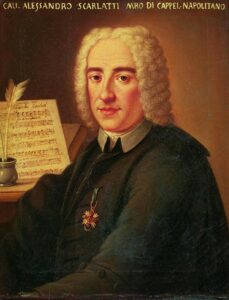Scarlatti, Cantata Pastorale per la nascità di nostro Signore
The Scarlatti family from Sicily included quite a few successful musicians. Alessandro Scarlatti (1660-1725) was the second of eight children born to Pietro and Eleanora, five of whom had musical careers. Alessandro would sire ten children, two of whom had musical careers, including Domenico (1685-1757) whom we have feature in this serious previously and in our Composer Showcase.
Unlike Domenico whose legacy is tied primarily to works for keyboard, his father Alessandro made his mark primarily in opera, although he wrote in virtually all of the popular genres of his time.
Born in Sicily, he went to Rome at the age of 12 to study music, perhaps, although not confirmed, with Carissimi. He was appointed Maestro di cappella in 1678 and seeing his large-scale operas and oratorios performed by 1679. He secured important patronage from Queen Christina of Sweden (then exiled in Rome), Cardinals Pamphili and Ottoboni, and Prince Ferdinando de Medici.
In 1684 he moved to Naples and became the leading composer of opera there; more than half of the new operas stage in Naples over the next two decades were written by Scarlatti. Naples was at the time, however, not the prominent center of opera that it would later become. He left Naples in 1702 among increasing political instability and moved to Florence in hope of finding employment for his son Domenico. That effort failed, however, and he settled in Rome in 1703. The opera houses had been closed by papal decree, so Scarlatti focused on motets and masses. He nevertheless produced four operas that were performed in Siena, Livorno, and Florence.
By 1709, he was back in Naples writing operas as well as pursuing a new interest in instrumental works. This Christmas cantata for solo soprano, strings, and lute, also titled Oh di Betlemme altera povertà, dates from this period of Scarlatti’s life.
Cantatas used many of the forms present in operas and oratorios—recitative, aria, instrumental sinfonietta. You may notice similarities in style with Handel’s writing. Handel was acquainted with Scarlatti and spent several years in Italy from 1706 to 1710 absorbing the Italian style, epitomized by Scarlatti.




